SPEAKERS
 Len Barrie
Len Barrie
Dr. Len Barrie is the director of the Atmospheric Research and Environment Program (AREP) of the World Meteorology Organization (WMO) at the United Nations. AREP is tasked with coordinating and stimulating research on the composition of the atmosphere and weather forecasting, focusing on extreme weather events and socio-economic impacts. Under programmatic guidance from the Commission for Atmospheric Sciences, AREP supports global research initiatives through two programs: Global Atmosphere Watch (GAW) and the World Weather Research Program (WWRP). WWRP supports research to develop improved and cost-effective forecasting techniques and their application for socio-economic benefit and in decision-making. Activities are conducted related to synoptic forecast verification and linking forecast products to societal benefit areas. GAW focuses on the coordination and application of global observations of atmospheric greenhouse gases, ozone, ultraviolet radiation, aerosols, selected reactive gases, precipitation chemistry and the urban meteorology and environment project. It supports international conventions on ozone depletion, climate and long-range transport of air pollution. With community support GAW issues WMO Ozone Bulletins and Greenhouse Gas Bulletins.
Dr. Barrie joined the World Meteorological Organization in 2002 as Chief of the Environment Division in charge of coordinating the Global Atmospheric Watch (GAW) program. Prior to that he was Chief Atmospheric Scientist at the Pacific Northwest National Laboratory in the U.S., and has served in leadership positions on numerous Canadian and international scientific efforts focusing on atmospheric chemistry, contaminants, aerosols, and polar processes. He is a member at large of the Executive Committee of the International Association of Meteorology and Atmospheric Science (IAMAS), and a former vice-president and general secretary of the IAMAS Commission for Atmospheric Chemistry and Global Pollution. Dr. Barrie is a fellow of the Academy of Science of the Royal Society of Canada.
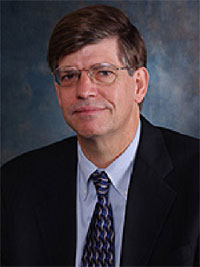 Bruce H. Braine
Bruce H. Braine
Bruce H. Braine is vice president for strategic policy analysis for American Electric Power Service Corp. In this position, he focuses on analysis of federal and state energy and environmental policy as well as analysis and development of long-term environmental and energy strategy for AEP. Braine joined AEP in 1997 as senior vice president - analysis for AEP Energy Services, an AEP subsidiary. He was named vice president - strategic policy analysis in 2000. Braine has a bachelor's degree from Brown University and a master's degree in business administration from Stanford, where he graduated from Stanford's Public Management Program. Before joining AEP Energy Services in 1997, Braine was a principal in the Washington, D.C., economic and management consulting firm of Putnam, Hayes and Bartlett. Braine also served as a senior vice president at ICF-Kaiser International, where he directed ICF's $6 million electric utility business consulting unit.
Braine serves as a member of EPRI's Global Climate Change Committee, on the Board of Directors of the Chicago Climate Exchange, on the Board of Directors of the International Emissions Trading Association (IETA) and as co-chair of IETA's US working group, on the EEI Strategic Issues Committee and EEI Economics and Public Policy Executive Advisory Committee, on the Board of Directors of the Ohio Association of Non-Profit Organizations (OANO) and on the finance committee and as chairman of the pension committee of the United Way in central Ohio.
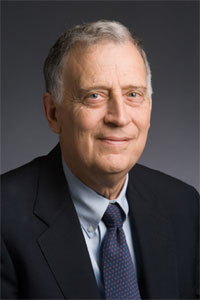 Ralph Cicerone
Ralph Cicerone
Dr. Ralph J. Cicerone is president of the National Academy of Sciences and chair of the National Research Council. Before coming to the Academy, he served from 1998 to 2005 as chancellor of the University of California at Irvine, where he had been dean of physical sciences and a member of the faculty since 1989. He has received a number of awards for his research in atmospheric chemistry and climate change, which was recognized on the citation for the 1995 Nobel Prize in chemistry awarded to UCI colleague F. Sherwood Rowland. He has served on many NAS and NRC committees, and chaired the 2001 study of the current state of climate change and its impact on the environment and human health requested by President Bush. Dr. Cicerone is a member of the American Academy of Arts and Sciences and the American Philosophical Society, and has served as president of the American Geophysical Union. He received his bachelor’s degree in electrical engineering from the Massachusetts Institute of Technology, where he was also a varsity baseball player, and his master’s and doctoral degrees from the University of Illinois in electrical engineering, with a minor in physics.
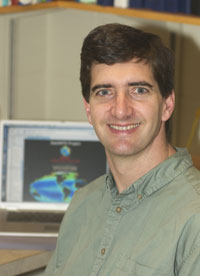 Scott Doney
Scott Doney
Dr. Scott Doney is chair of the U.S. Ocean Carbon and Biogeochemistry Program and a senior scientist in the Department of Marine Chemistry and Geochemistry at the Woods Hole Oceanographic Institution (WHOI). He is also chair of the Ocean Carbon and Climate Change Scientific Steering Group at the U.S. Carbon Cycle Science Program. His current research focuses on the global carbon cycle and ocean ecology response to natural and human-driven climate change, and if that response will act to dampen or accelerate climate trends. Of particular concern is ocean acidification due to the invasion of carbon dioxide from fossil fuel burning. He serves in advisory capacities for numerous organizations including NASA, NOAA, the National Center for Atmospheric Research (NCAR), and the National Science Foundation. Dr. Doney joined the Woods Hole Oceanographic Institution in 2002. Prior to that, he worked 11 years at the Advanced Study Program and the Climate and Global Dynamics Division at NCAR. He has recently been awarded the W. Van Alan Clark Sr. Chair 2007-2011, at WHOI. He was a 2004 Fellow at the Aldo Leopold Leadership Program, and was awarded the James B. Macelwane Medal from the American Geophysical Union in 2000. Dr. Doney earned a Ph.D. in Chemical Oceanography from the Massachusetts Institute of Technology-Woods Hole Oceanographic Institution Joint Program in 1991. He received a B. A. in Chemistry from the University of California at San Diego in 1986.
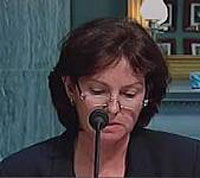 Victoria Fabry
Victoria Fabry
Dr. Fabry is Professor of Biology, and former Chair, of the Department of Biological Sciences at California State University San Marcos. She is a biological oceanographer whose research interests encompass plankton ecology and the role of marine organisms in geochemical cycles. The oceanic uptake of atmospheric CO2 resulting from human activities is expected to lower the surface ocean pH and change the chemistry of seawater. A particular concern is how the new chemistry will affect organisms that calcify the oceanic CO2 and the ultimate impact on the global carbon cycle. The response of calcifying organisms to elevated ocean CO2 and the dissolution of biogenic calcium carbonate in the upper ocean are two areas of current work in Dr. Fabry’s research group.
She previously served with the Marine Environment Laboratory of the International Atomic Energy Agency in Monaco, and with the Chemistry Department at the Woods Hole Oceanographic Institution in Massachusetts. Dr. Fabry is the recipient of the President’s Award for Scholarship and Creative Activity (2006), the President’s Award for Innovation in Teaching (2001), and the National Sea Grant John Knauss Congressional Fellowship (U.S. Senate Commerce Committee, Washington, D. C., 1984). Dr. Fabry received a B.A. in Biology from the University of California Santa Barbara in 1976. She received the M.A. and Ph.D. in Biology in 1983 and 1988 also from the University of California Santa Barbara.
Dick Feely
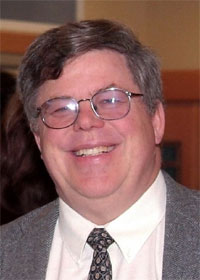 Dr. Richard A. Feely is a supervisory oceanographer at the NOAA Pacific Marine Environmental Laboratory in Seattle. He also holds an affiliate full professor faculty position at the University of Washington School of Oceanography. His major research areas are carbon cycling in the oceans and ocean acidification processes. He is the co-chair of the U.S. CLIVAR/CO2 Repeat Hydrography Program. He is also a member of the U.S. Science Steering Committees for the U.S. Carbon Cycle Science Program, the U.S. Ocean Carbon and Climate Change Program, and the U.S. Carbon and Biochemistry Program. He is a member of the American Geophysical Union, the American Association for the Advancement of Science and the Oceanography Society. Dr. Feely has authored more than 160 refereed research publications. He was awarded the Department of Commerce Gold Award in 2006 for his pioneering research on ocean acidification. In 2007, Dr. Feely was elected to be a Fellow of the American Geophysical Union. He received a B.A. in chemistry from the University of St. Thomas, in St Paul, Minnesota in 1969. He then went onto Texas A&M University where he received both an M.S. degree in 1971 and a Ph.D. degree in 1974. Both of his post-graduate degrees were in chemical oceanography.
Dr. Richard A. Feely is a supervisory oceanographer at the NOAA Pacific Marine Environmental Laboratory in Seattle. He also holds an affiliate full professor faculty position at the University of Washington School of Oceanography. His major research areas are carbon cycling in the oceans and ocean acidification processes. He is the co-chair of the U.S. CLIVAR/CO2 Repeat Hydrography Program. He is also a member of the U.S. Science Steering Committees for the U.S. Carbon Cycle Science Program, the U.S. Ocean Carbon and Climate Change Program, and the U.S. Carbon and Biochemistry Program. He is a member of the American Geophysical Union, the American Association for the Advancement of Science and the Oceanography Society. Dr. Feely has authored more than 160 refereed research publications. He was awarded the Department of Commerce Gold Award in 2006 for his pioneering research on ocean acidification. In 2007, Dr. Feely was elected to be a Fellow of the American Geophysical Union. He received a B.A. in chemistry from the University of St. Thomas, in St Paul, Minnesota in 1969. He then went onto Texas A&M University where he received both an M.S. degree in 1971 and a Ph.D. degree in 1974. Both of his post-graduate degrees were in chemical oceanography.
 Chris Field
Chris Field
Dr. Chris Field is the founding director of the Carnegie Institution's Department of Global Ecology, Professor of Biological Sciences at Stanford University, and Faculty Director of Stanford's Jasper Ridge Biological Preserve. For most of the last two decades, Field has worked to establish the science of global ecology. His research emphasizes mechanisms that control the carbon cycle and its interactions with climate, from the molecular to the global scale. In more than 200 scientific publications, Field and his colleagues have used diverse approaches, integrating information from plant physiological approaches, satellites, atmospheric observations, historical data, and models. They have explored local- and global-scale patterns of climate-change impacts, vegetation-climate feedbacks, carbon cycle dynamics, primary production, forest management, and fire. At the ecosystem-scale, Field has, for more than a decade, led major experiments on responses of California grassland to multi-factor global change, experiments that integrate approaches from molecular biology to remote sensing. Field has served on many national and international committees related to global ecology, including committees of the National Research Council, the International Geosphere-Biosphere Programme, and the Earth System Science Partnership. Field was a coordinating lead author for the fourth assessment report of the Intergovernmental Panel on Climate Change, with responsibility for the chapter on North America. He is a fellow of the ESA Aldo Leopold Leadership Program and a member of the US National Academy of Sciences. He has served on the editorial boards of Ecology, Ecological Applications, Ecosystems, Global Change Biology, and PNAS. Field received his PhD from Stanford in 1981 and has been at the Carnegie Institution since 1984. His recent priorities include high performance "green" laboratories, integrity in the use of science by governments, local efforts to reduce carbon emissions, ecological impacts of biofuels, and the future of scientific publishing.
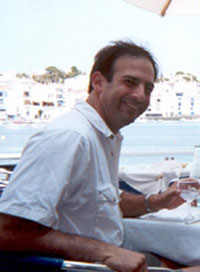 S. Julio Friedmann
S. Julio Friedmann
Dr. S. Julio Friedmann is the Carbon Management Program Leader for Lawrence Livermore National Laboratory, where he leads initiatives and research into carbon capture, carbon storage, and fossil fuel recovery and utilization. In this role, he has submitted Congressional testimony for the U.S. Senate and California Assembly and testified before the House Energy and Commerce Committee. Published in Foreign Affairs and the New York Times, he has worked with the Environmental Protection Agency, U.S. Geological Survey, many private companies, many non-governmental organizations, and the U.S. Department of Energy. He was invited by the Massachusetts Institute of Technology to joint their team on the Future of Coal Energy Report and helped assemble the National Petroleum Council report on the future of oil and gas in the U.S. His research interests include carbon sequestration, underground coal gasification, hydrocarbon systems, deep-water depositional systems, basin & range tectonics and sedimentation, sequence stratigraphy, and landslide physics. Friedmann received his B.S and M.S. degrees from M.I.T., followed by a Ph.D. at the University of Southern California. After graduation, he worked for five years as a senior research scientist in Houston, first at Exxon and later ExxonMobil. He next worked as a research scientist at the University of Maryland, with the Joint Global Change Research Institute (JGCRI) at the University of Maryland, and the Colorado Energy Research Institute at the Colorado School of Mines. A native of Rhode Island, he has worked in California, Washington, Utah, Wyoming, Colorado, Spain, Ireland, the North Sea, Nigeria, Angola, Venezuela, Azerbaijan, and Australia.
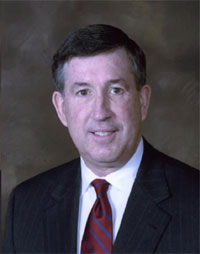 VADM Paul Gaffney
VADM Paul Gaffney
Paul G. Gaffney II became the seventh President of Monmouth University in July 2003. President Gaffney, a retired Navy Vice Admiral, is a respected academic leader and proponent. He was president of the National Defense University from 2000 to 2003. Prior to assuming those duties, he was the Chief of Naval Research with responsibility for science and technology investment; a substantial part of which supported basic research in American universities. He was appointed by President George W. Bush to the U.S. Ocean Policy Commission and served during its full tenure 2001-2004. His distinguished naval career spanned over three decades including duty at sea, overseas and ashore in executive and command positions. He served in Japan, Vietnam, Spain, and Indonesia, and traveled extensively in official capacities. While a military officer, his career focused on oceanography, research administration and education.
He has been recognized with a number of military decorations, the Naval War College’s J. William Middendorf Prize for Strategic Research, the Outstanding Public Service Award from the Virginia Research and Technology Consortium, the Potomac Institute’s Navigator Award and was named a Charter Member of the United States Naval Academy’s Oceanography Department Pillars of Excellence. He is a Fellow, American Meteorological Society. He has served on several boards of higher education and was a member of the Ocean Studies Board of the National Research Council. He has been selected to be a Public Trustee for the New Jersey Marine Consortium and chaired the Governor’s Commission to Protect and Enhance New Jersey’s Military Bases. He serves on the Meridian Health Board of Trustees and is a Director, Diamond Offshore Drilling, Inc. In 2005 the New Jersey Research and Development Council named President Gaffney “Educator of the Year.”
He is a 1968 graduate of the U.S. Naval Academy. Upon graduation, he was selected for immediate graduate education and received a master’s degree in Ocean Engineering from Catholic University of America in Washington, DC. He completed a year as a student and advanced research fellow at the Naval War College, graduating with highest distinction. He completed an MBA at Jacksonville University. The University of South Carolina, Jacksonville University, and Catholic University have awarded him honorary doctorates.
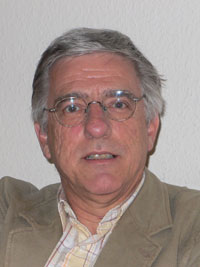 Dr. Martin Heimann
Dr. Martin Heimann
Dr. Martin Heimann is a director at the Max-Planck-Institute for Biogeochemistry in Jena, member of the Max-Planck-Society and honorary professor at the Friedrich-Schiller-University of Jena, Germany. Over the last three decades Martin Heimann has worked on analyzing and modeling the global carbon cycle and its interaction with the physical climate system. In 1982-1985 he worked as a research assistant at the Scripps Institution of Oceanography in La Jolla, California in the group of Dr. Charles David Keeling. Later he became a senior research scientist and workgroup leader at the Max-Planck-Institute for Meteorology in Hamburg, Germany. In 1998 he moved to the newly founded Max-Planck-Institute for Biogeochemistry in Jena, Germany. Martin Heimann has been the coordinator of numerous national and European projects in global and regional carbon cycle research. Among these he was coordinator of Terrestrial Carbon Observing System - Siberia, an European Union project for the determination of the carbon balance of Siberia by means of in situ observations and models. He is currently a co-coordinator of CarboEurope-IP, a European integrated project to quantify the European carbon balance, its spatial and temporal variability and its driving processes. Martin Heimann has been a lead author in Working Group I of the last three assessment reports of the Intergovernmental Panel on Climate Change (IPCC); he is editor of several scientific journals, and review editor of "Science." He is an elected member of the Academia Europaea. Martin Heimann has received a Ph.D. in physics at the University of Bern.
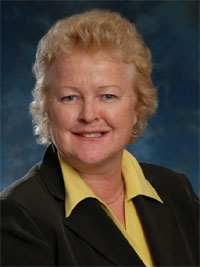 Helen Howes
Helen Howes
Ms. Helen Howes is Vice President, Corporate Environment, Health & Safety, Exelon Corporation. Helen Howes is responsible for governance and oversight of the environment and safety function across the company. In this function, she is responsible for environment and safety compliance, environmental auditing, development of corporate environment policy and strategy, as well a programs on climate change, internal energy efficiency and recycling, and external stakeholder outreach. Howes joined Exelon Corporation as vice president of environment, health and safety (EH&S) in July 2003. Howes has 25 years experience in environmental management, environmental strategy/policy development, environmental planning and sustainable development work. Howes previously served as vice president, sustainable development, for Ontario Power Generation. Howes sits on the Board of Directors of the Pennsylvania Environment Council and the Board of Trustees for the Illinois Nature Conservancy. She is also a member of the PA Governor's Energy Advisory Board and the Advisory Council of the Women's Council on Energy & the Environment. Howes received her master's degree in environmental studies from York University, Canada in 1977, and a Bachelor of Science in aquatic biology from Queens University, Canada in 1975.
 David Karl
David Karl
Dr. David Karl presently serves as Director of the recently established National Science Foundation-Science and Technology Center (NSF-STC) for Microbial Oceanography: Research and Education (C-MORE) and as professor of Oceanography in the School of Ocean and Earth Science and Technology (SOEST). His research has always focused on the ecological role of microorganisms in the sea, and has been largely field-oriented, including 23 expeditions to Antarctica. In October 1988, he and Roger Lukas (also at University of Hawaii) led a team of scientists in the establishment of the Hawaii Ocean Time-series (HOT) program to observe and interpret long-term changes in the physics, chemistry and biology of the open ocean at 22°45’N, 158°W. Measurements at the deep water reference Station ALOHA include dissolved inorganic carbon and alkalinity, which can be used to derive estimates of the partial pressure of carbon dioxide (pCO2) and pH. From the nearly 20-year data set, he and Lukas have chronicled a rise in near-surface ocean pCO2 and an increase in ocean acidity. In many ways, Station ALOHA is the oceanic analogue of the Mauna Loa observatory, and we look forward to the year 2038 when we will celebrate the 50th year of HOT! When he is not at sea, working in his office or responding to email, he enjoys motorcycling, bicycling, hiking and ocean recreation. Dave Karl received his Ph.D. degree in Biological Oceanography from the University of California at San Diego in 1978 and moved to his current position at the University of Hawaii that same year.
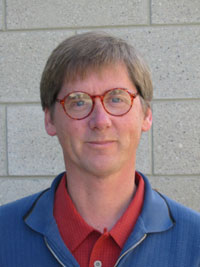 Ralph F. Keeling
Ralph F. Keeling
Ralph Keeling is professor of geochemistry at the Scripps Institution of Oceanography, University of California, San Diego. His research focuses on atmospheric chemistry, the carbon cycle, and climate change. He is considered a leading investigator of the global oxygen cycle for his precise measurements and analysis techniques. In the late 1980s, Keeling developed his method for measuring atmospheric oxygen levels utilizing interferometry techniques in the laboratory. Since 1989 his group has been measuring changes in atmospheric oxygen levels from air samples collected at stations around the world.
Keeling received a B.S. in physics from Yale University in 1979, and a Ph.D in applied physics from Harvard University in 1988. He has been affiliated with Scripps since 1992. He previously served as a visiting scientist at the National Center for Atmospheric Research (NCAR). He completed postdoctoral fellowships at Harvard and NCAR. He received the Rosenstiel Award from the University of Miami's Rosenstiel School of Marine and Atmospheric Science in 1992, the Outstanding Publication Award from NCAR in 1992. Keeling is a member of the American Geophysical Union. Keeling and his family reside in San Diego, California.
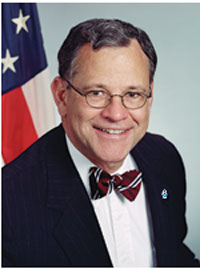 Timothy R.E. Keeney
Timothy R.E. Keeney
Mr. Timothy R.E. Keeney is deputy assistant secretary for Oceans and Atmosphere at the National Oceanic and Atmospheric Administration (NOAA). At NOAA, Mr. Keeney is responsible for environmental policy, strategic planning and program analysis. His major responsibilities include cross-cutting programs such as coral reefs, invasive species, habitat restoration and observation systems. He has served in numerous public and private positions throughout his career. Most recently, he served as director of environmental services for Northeast Utilities Service Company in Hartford, Conn., beginning February 1998. During his career, Mr. Keeney has held several environmental management and regulatory positions, including NOAA general counsel, and director of Ocean and Coastal Resource Management at the NOAA Oceans and Coasts Service. He served as commissioner for the Connecticut Department of Environmental Protection and director of the Rhode Island Department of Environmental Management. He was also president of Dufrane Nuclear Services, Inc. in Avon, Conn.
A retired captain in the United States Navy, Mr. Keeney’s last duty assignment concluded in June 2005. Prior to retiring, he was commander of Naval Reserve SEAL Forces, Naval Warfare Command, at Coronado Naval Amphibious Base San Diego, Calif. Mr. Keeney earned a bachelor's degree from the Wharton School of Business at the University of Pennsylvania in 1970 and a doctor of laws degree from the University of Connecticut School of Law in 1976. He also completed the environmental leadership program at Yale University's School of Forestry and Environmental Studies.
 David Keith
David Keith
Dr. David Keith is director of the Institute for Sustainable Energy Environment and Economy (ISEEE) Energy and Environmental Systems Group, at the University of Calgary. He is Canada Research Chair in Energy and the Environment, and Professor in the Department of Chemical and Petroleum Engineering and Department of Economics, University of Calgary. Keith is also Adjunct Professor in the Department of Engineering and Public Policy, Carnegie Mellon Professor Keith works near the interface between climate science, energy technology and public policy. His technical and policy work addresses the capture and storage of CO2, the economics and climatic impacts of large-scale wind power, the use of hydrogen as a transportation fuel, and the technology and implications of geoengineering. Keith has served as a member of several advisory boards and panels including Canada’s ‘blue ribbon’ Panel on Sustainable Energy Technology and as a member of U.S. National Academy committees. He currently serves on Canada’s Capture and Storage Task Force, and is one of the world’s energy experts named by national science academies to the InterAcademy Council study on Transitions to Sustainable Energy Systems. Keith has addressed technical audiences with articles in Science and Nature; he has consulted for national governments, industry and environmental groups, and has reached the public through national media in Canada and the U.S. As an undergraduate, Keith took first prize in Canada’s national physics prize exam. As a graduate student, he won MIT’s biennial departmental prize for excellence in experimental physics, and most recently he was named environmental scientist of the year by Canadian Geographic in 2006. Keith spent most of his career in the U.S. at Carnegie Mellon, Harvard and the National Center for Atmospheric Research. He returned to Canada in 2004 to build a research group on energy and environmental systems in Calgary.
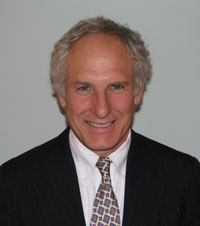 Paul Kirshen
Paul Kirshen
Dr. Paul H. Kirshen is Director and Co-Chair of the Water: Systems, Science, and Society Research and Graduate Program, and Research Professor in Civil and Environmental Engineering at Tufts University, where he is also affiliated with the Fletcher School of Law and Diplomacy. For 30 years he has led complex, interdisciplinary teams and participatory research projects in developed and developing countries related to water resources operations, integrated water resources management, coastal zone management, climate change impacts and adaptation, and decision support systems. He served with the Intergovernmental Panel on Climate Change, as an expert reviewer for the Fourth Assessment Report, Working Group II, "Climate Change Impacts, Adaptation and Vulnerability".
Dr. Kirshen was Principal Investigator for a $1 million U.S. Environmental Protection Agency (EPA) grant to investigate the integrated impacts of climate change on metropolitan Boston and to develop recommendations for adaptation actions (CLIMB Project, 1999-2004). Justice Stevens of the U.S. Supreme Court cited the research on the impacts of climate change-induced sea level rise on metropolitan Boston several times in the majority Supreme Court opinion that gave EPA the authority to regulate greenhouse gases in automobile emissions (No. 05-1120, decided April 2, 2007). Recently, Dr. Kirshen led a team investigating climate change coastal flooding impacts in the Northeastern US for the Union of Concerned Scientists. He has developed decision support tools using weather and climate information for reservoir management and agriculture in New England and elsewhere. He teaches courses in water resources engineering and integrated water resources management, and has also been a practicing engineer and engineering consultant in the private sector.
Dr. Kirshen received a B.S. in Engineering from Brown University in 1970. He obtained the M.S. in 1972 and the PhD in 1975 in Civil Engineering, Division of Water Resources, from the Massachusetts Institute of Technology. He is a Universities Council on Water Resources Fellow at the US Army Corps of Engineers Institute for Water Resources. He is a member of the American Geophysical Union, the American Society of Civil Engineers, where he has contributed extensive committee work, the International Water Resources Association, Sigma Xi, and the Advisory Board for Brown University’s Civil Engineering Program.
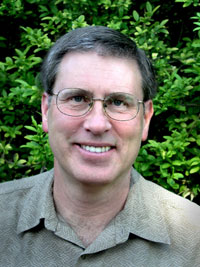 Chuck Kutscher
Chuck Kutscher
Chuck Kutscher is a Principal Engineer and Manager of the Thermal Systems Group at the National Renewable Energy Laboratory in Golden, Colorado where he has worked for 29 years. His research interests include concentrating solar power, solar heating, and geothermal electricity generation. He served for nine years on the Board of Directors of the American Solar Energy Society (ASES), including a two-year term as Chair (2000-2001). Dr. Kutscher was General Chair of the SOLAR 2006 National Solar Energy Conference held in Denver in July 2006, which brought the nation’s top climate scientists and renewable energy experts together to develop solutions to global warming. He is editor of the ASES report, Tackling Climate Change in the U.S., available at www.ases.org/climatechange. Dr. Kutscher has a B.S. in physics from the State University of New York at Albany, an M.S. in nuclear engineering from the University of Illinois, and a Ph.D. in mechanical engineering from the University of Colorado at Boulder.
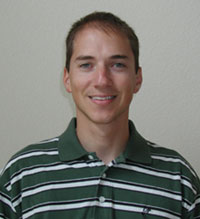 David Lobell
David Lobell
Dr. David Lobell is currently a Lawrence Fellow at Lawrence Livermore National Laboratory in California, where he researches the impact of climate change on crop production and food security. He also studies the application of remote sensing and other informatics tools to agricultural decision making. David received a Sc.B. in Applied Mathematics from Brown University in 2000, and a Ph.D. in Geological and Environmental Sciences from Stanford University in 2005.
 Alexander MacDonald
Alexander MacDonald
Dr. Alexander E. (Sandy) MacDonald was named the first Director of the Earth System Research Laboratory and first Deputy Assistant Administrator for NOAA Research Laboratories and Cooperative Institutes on July 27, 2006. Dr. MacDonald served as Acting Director for the Earth System Research Laboratory and Director of the ESRL Global Systems Division during the consolidation of the Boulder Laboratories into the Earth System Research Laboratory in 2006. Prior to the consolidation, Dr. MacDonald led the Forecast Systems Laboratory. Dr. MacDonald was the Director of the Program for Regional Observing and Forecasting Services (PROFS) from 1983 to 1988. From 1980 - 1982, he was Chief of PROFS' Exploratory Development Group and from 1975 - 1980 he was a Techniques Improvement Meteorologist in the Scientific Services Division, Western Region, National Weather Service in Salt Lake City, UT. He was an Air Force Officer while a member of the U.S. Air Force from 1967 - 1971.
Dr. MacDonald received a B.S. in Mathematics and Physics from Montana State University in 1967, and the U.S. Air Force Weather Course Certificate in Meteorology from St. Louis University in 1968. He received the M.S. and Ph.D. degrees in Meteorology with a minor in Computer Science from the University of Utah in 1973 and 1975.
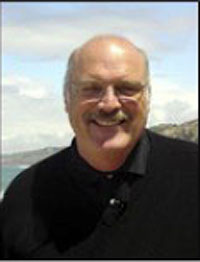 W. Kendall Melville
W. Kendall Melville
Dr. W. Kendall Melville is a professor of oceanography in the Marine Physical Laboratory and the Physical Oceanography Research Division at Scripps Institution of Oceanography at UC San Diego. His research interests include fluid mechanics and its application in oceanography, especially in air–sea interaction, acoustic and microwave remote sensing, and ocean waves.
Melville was born in Sydney, Australia, in 1946. He received B.Sc., B.E., and M.Eng.Sc. degrees from the University of Sydney, and a Ph.D. in aeronautics and astronautics from Southampton University in the United Kingdom. He moved from Australia to the Institute of Geophysics and Planetary Physics at Scripps in 1977, and then took a faculty position at MIT in 1980, participating in the MIT Woods Hole Joint Program until 1991 when he returned to Scripps.
He served as chair of the Scripps Graduate Department from 1996 to 2001 and deputy director for education in 2000-01. He is currently deputy director for research at Scripps, and director of the Joint Institute for Marine Observations. He has been an affiliated professor in mechanical and aerospace engineering at UCSD since 1998.
Melville is a fellow of the Acoustical Society of America and the American Physical Society, and a member of the American Geophysical Union and the American Meteorological Society. He received a John Simon Guggenheim Memorial Fellowship in 1986 for research on ocean waves. He has served on review committees for the National Research Council, the National Science Foundation, NASA and the Office of Naval Research, and as associate editor of the Journal of Geophysical Research (Oceans).He is the author or coauthor of more than 100 papers on laboratory, theoretical, numerical, and field investigations in fluid mechanics and oceanography.
Melville and his family live in La Jolla, CA.
 Ed Miles
Ed Miles
Dr. Edward L. Miles is Virginia and Prentice Bloedel Professor of Marine Studies and Public Affairs at the School of Marine Affairs, University of Washington. He holds a joint appointment in the Evans School of Public Affairs, an adjunct appointment in the School of Aquatic and Fisheries Sciences, and is a Senior Fellow in the Joint Institute for the Study of Atmosphere and Oceans where he serves as Co-Director of the Center for Science in the Earth System and team leader of the Climate Impacts Group. His fields of specialization include international law and organization; marine policy and ocean management; science, technology, and international relations; and the human dimensions of climate variability and climate change. Professor Miles is a member of the U.S. National Academy of Sciences and a Fellow of the American Association for the Advancement of Science.
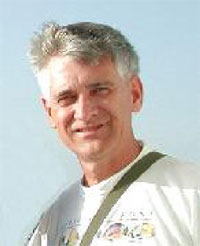 Forrest Mims
Forrest Mims
Forrest Mims is the most widely read electronics author in the world. His sixty books have sold over 7.5 million copies and have twice been honored for excellence by the Computer Press Association. His work has appeared in some 70 magazines and science journals, including Nature, Scientific American, Science, Geophysical Research Letters, Journal of Geophysical Research, Applied Optics, Bulletin of the American Meteorological Society, New Scientist, Sky & Telescope, Electronics, Electronic Design, and IEEE Spectrum.
Forrest’s consulting clients have included the National Geographic Society, the National Science Teachers Association, NOAA and NASA’s Goddard Space Flight Center, which twice assigned him to monitor air quality in Brazil during the annual burning season. Forrest also teaches experimental Earth science once or twice a year at the University of the Nations at their campuses in Kona, Hawaii, and Lausanne, Switzerland. In 1993, he was named a Laureate in the Rolex Awards for Enterprise competition for his efforts in establishing a global ozone measuring network that used instruments of his own design.
In 1975, Forrest wrote The Altair 8800 Operator’s Manual, the manual for the world’s first successful personal computer. While he was writing the Altair manual, a couple of young programmers named Bill Gates and Paul Allen were creating a version of BASIC for the Altair. (That was the start of a company called Microsoft.) Thus, Forrest holds the honor of having written the very first book about personal computers.
Adapted from a biography by editor and publisher Harry L. Helms.
 Joanne Morin
Joanne Morin
Joanne O. Morin is the manager of Climate and Energy Programs for the Air Division of the New Hampshire Department of Environmental Services. In this capacity, she is responsible for many initiatives to promote cleaner energy sources, energy efficiency, and energy conservation in the transportation, power generation, commercial, industrial and residential sectors. She also directs the outreach and rulemaking efforts for the Air Division. Recently, she facilitated a stakeholder process to develop a renewable portfolio standard for New Hampshire which was recently passed by the NH General Court. For the past three years, she has served as the New Hampshire representative on the staff working group for the Regional Greenhouse Gas Initiative, a proposed “cap and trade” program for limiting carbon dioxide emissions from major electric power plants in 10 eastern states. Her previous experience includes twelve years as an environmental consultant and four years as a Corporate Environmental Manager for The Timberland Company. Her previous environmental work ranged from Superfund litigation to monitoring overseas labor and environmental conditions.
 Fredrick Palmer
Fredrick Palmer
Mr. Fred Palmer is senior vice president of government relations of Peabody Energy. He joined Peabody in February 2001 and is responsible for advancing state and federal policies related to the production and use of coal. He is a member of the National Coal Council, serves on its executive committee, and is chairman of its coal policy committee. He is on the board of directors of the FutureGen Industrial Alliance. Mr. Palmer has served on the board of directors for the U.S. Chamber of Commerce, the World Coal Institute, and the National Mining Association. He has chaired the legal committee and climate change task force for the National Mining Association. He was the general manager and chief executive officer for the Western Fuels Association from 1985 to 2000, and he served as general counsel from 1980 to 1985. Prior to this, Mr. Palmer was a partner at Duncan, Brown, Weinberg & Palmer, from 1972 to 1980, and a staff assistant to Congressman Morris K. Udall from 1969 to 1971. Mr. Palmer received a B.A. in 1966 and a Juris Doctorate with honors in 1969 from the University of Arizona.
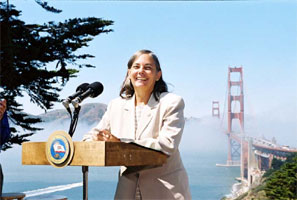 Fran Pavley
Fran Pavley
Fran Pavley has served three terms in the California State Assembly. She became known as one of the most effective legislators in Sacramento. Serving with integrity and vision, the former Mayor of Agoura Hills and long time public school teacher, had over 70 of her bills and resolutions become law. During her tenure in the Assembly, Fran focused on education, the environment, consumer protection, public safety and creating a clean, secure energy future for California and the U.S. Her landmark legislation on global warming has become a model for other states and countries to follow.
For example, 11 other states and Canada have modeled their laws after Fran's Clean Car Regulations, AB 1493, (also known as the Pavley Bill). As the author of the "Global Warming Solutions Act of 2006" (AB 32), there will now be a cap on greenhouse gas emissions emitted from California. This will help spur an increased investment in alternative fuels, renewable energy and clean technologies. Her leadership on the most important environmental issue facing our world in the 21st Century has been recognized by many entities, including being selected as one of Scientific American's Top Technology Leaders in Transportation, and receiving the 2006 California League of Conservation Voters "Global Warming Leadership Award" along with former Vice President Al Gore.
Prior to serving in the State Legislature, Fran Pavley, became the first Mayor of the new City of Agoura Hills in 1982. She served as a Mayor and Councilmember for four terms, focusing on protecting the quality of life for her community. In order to become a more effective elected official and to better prepare herself to make sound land use decisions, Fran returned to college and earned a Master's Degree in Environmental Planning.
 Wouter Peters
Wouter Peters
Dr. Wouter Peters is a part-time assistant professor in the Meteorology and Air Quality group of Wageningen Research University in The Netherlands, as well as a research affiliate at the NOAA Earth System Research Laboratory (ESRL) in Boulder, Colorado. His research focuses on deriving greenhouse gas budgets from atmospheric observations. After finishing his dissertation in 2003, he joined NOAA ESRL’s Global Monitoring Division to apply his knowledge on global atmospheric transport modeling to the carbon cycle. His work on this topic has led to a number of refereed publications on data assimilation methods, and the North American carbon cycle. Dr. Peters is co-chair of the international TransCom Continuous experiment, and on the scientific steering committee of this meeting. He received an M.Sc. in meteorology and oceanography from the Utrecht University in 1998, and went on to get a Ph.D. in atmospheric chemistry under supervision of Prof. Dr. Jos Lelieveld, Prof. Dr. Maarten Krol, and Prof. Dr. Paul Crutzen.
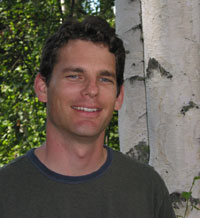 Ted Schuur
Ted Schuur
Ted Schuur is an Assistant Professor in the Department of Botany at the University of Florida as well as a Research Associate in the Institute for Arctic Biology at the University of Alaska Fairbanks. He is an ecologist who studies interactions between terrestrial carbon cycling and climate change. In particular, he uses geochemical techniques for measuring natural abundance 14C in ecosystem pools and fluxes to trace the sources of carbon emissions to the atmosphere. One of his major research interests is to understand feedbacks to atmospheric CO2 from warming temperature, thawing permafrost and changing fire regimes in high latitudes ecosystems. His work on this topic has included over a decade of research in boreal and arctic Alaska and northeastern Siberia. He has participated in national and international meetings, workshops, and panels on the topic of ecology and the environment. He has received new investigator awards from NASA and the Andrew W. Mellon Foundation for his work on carbon and nutrient cycling in terrestrial ecosystems. He is a native of Michigan and graduated Magna Cum Laude with a BS from the University of Michigan in 1991. He received a PhD from the University of California-Berkeley in 1999 and held a National Science Foundation Postdoctoral Fellowship in Bioinformatics at the University of California-Irvine before arriving in Gainesville, FL in 2001.
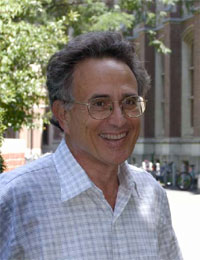 Robert Socolow
Robert Socolow
Dr. Robert H. Socolow, Professor of Mechanical and Aerospace Engineering at Princeton University, teaches in both the School of Engineering and Applied Science and the Woodrow Wilson School of Public and International Affairs. With ecologist Stephen Pacala, Socolow leads the University's Carbon Mitigation Initiative. Pacala and Socolow are the authors of “Stabilization wedges: Solving the climate problem for the next 50 years with current technologies,” which appeared in the August 13, 2004 issue of Science. Socolow was awarded the 2003 Leo Szilard Lectureship Award by the American Physical Society: “For leadership in establishing energy and environmental problems as legitimate research fields for physicists, and for demonstrating that these broadly defined problems can be addressed with the highest scientific standards.” Socolow earned a B.A. in l959 (summa cum laude) and Ph.D. in theoretical high energy physics in l964 from Harvard University.
 Susan Solomon
Susan Solomon
Dr. Susan Solomon is widely recognized as one of the leaders in the field of atmospheric science. She is best known for having pioneered both the theory explaining how and why the ozone hole occurs in Antarctica and obtaining some of the first chemical measurements that helped to establish the chlorofluorocarbons as its cause. In honor of that work, she received the National Medal of Science, which is the highest scientific honor in the US. She is also a recipient of the prestigious Blue Planet Prize of the Asahi Foundation in Japan. She has received many other honors, including the highest honor of the American Meteorological Society (the Rossby Medal) and she is the recipient of numerous honorary doctoral degrees from U.S. and foreign universities. A glacier in Antarctica has also been named after her, Solomon Glacier. She is a member of the U. S. National Academy of Sciences and a Foreign Associate of both the French Academy of Sciences and the European Academy of Sciences. Her current research includes climate change, ozone depletion, and the links between them, and she serves as co-chair of Working Group 1 of the Intergovernmental Panel on Climate Change (IPCC), which provides comprehensive scientific assessments of climate change for the public and for policymakers. She provided key leadership to the 2007 IPCC Scientific Assessment of Climate Change, released in February, 2007.
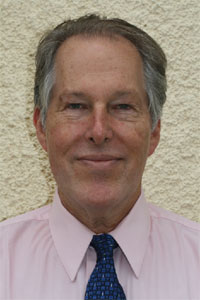 Richard Somerville
Richard Somerville
Dr. Richard C. J. Somerville is Distinguished Professor Emeritus at Scripps Institution of Oceanography, University of California, San Diego, USA. He is a theoretical meteorologist and an expert on computer simulations of the atmosphere. His research is on the role of clouds, cloud-radiation interactions, and cloud feedbacks in climate. His interests include all aspects of climate, including climate science outreach and the interface between science and public policy. He comments frequently on climate and environmental issues for the media. Somerville has received awards from the American Meteorological Society for both his research and his popular book, The Forgiving Air: Understanding Environmental Change, a new edition of which will be published in late 2007. Among many other honors, he is a Fellow of both the American Association for the Advancement of Science and the American Meteorological Society. He is a Coordinating Lead Author for the 2007 Fourth Assessment Report of the Intergovernmental Panel on Climate Change. He received the Ph.D. in meteorology from New York University in 1966 and has been a professor at Scripps since 1979.
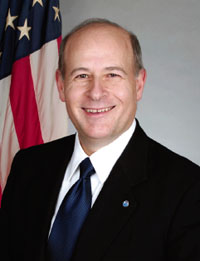 Rick Spinrad
Rick Spinrad
Dr. Spinrad, Co-Chair of the 50th Anniversary of the Global CO2 Record Symposium & Celebration, is the Assistant Administrator of the National Oceanic and Atmospheric Administration (NOAA) in the Office of Oceanic and Atmospheric Research (OAR). Dr. Spinrad has broad experience in marine science, technology, operations and policy. During his career he has worked in a wide range of positions in government, academia, industry and non-governmental organizations. As a research scientist at Bigelow Laboratory for Ocean Sciences he developed and published concepts critical to our understanding of the relationship between water clarity and marine biological productivity. Spinrad served as President of Sea Tech, Incorporated during that company’s development of several now-standard oceanographic sensors. He went on to manage oceanographic research at the Office of Naval Research (including serving as the Navy’s first manager of its ocean optics program), eventually becoming the Division Director for all of the Navy’s basic and applied research in ocean, atmosphere and space modeling and prediction. In 1994 Dr. Spinrad became the Executive Director of the Consortium for Oceanographic Research and Education (CORE) where he led the development of the National Ocean Sciences Bowl for High School Students, and he co-authored, with Admiral James D. Watkins, "Oceans 2000: Bridging the Millennia", which served as the guiding document for the establishment of the National Oceanographic Partnership Program (NOPP). In 1999 Spinrad became the Technical Director to the Oceanographer of the Navy. In this position he provided leadership and guidance for the development of the U.S. Navy’s oceanographic and meteorological operational support to Naval forces. Currently, Spinrad serves as the United States permanent representative to the Intergovernmental Oceanographic Commission of UNESCO, and co-chairs the White House Joint Subcommittee on Ocean Science and Technology. Rick Spinrad is the President of The Oceanography Society, and served as Editor in Chief of Oceanography magazine; he has served on numerous professional committees of organizations including the National Academy of Sciences and the American Meteorological Society. Spinrad also served on the faculties of the U.S. Naval Academy and George Mason University. He has spent over 300 days at sea conducting research, and has published more than 50 scientific articles. Spinrad is the editor of a textbook on ocean optics and several special issues of marine science journals. In 2003 Spinrad was awarded the Department of Navy Distinguished Civilian Service Award, the highest civilian award that can be given by the Navy Department, and he has received a
Presidential Rank Award. He is a native of New York City, and a graduate of the Johns Hopkins University (B.A.). Spinrad earned an M.S. in physical oceanography and a Ph.D. in marine geology from Oregon State University.
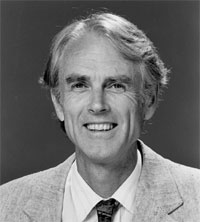 Pieter Tans
Pieter Tans
Dr. Pieter Tans is a Senior Scientist at the Earth System Research Laboratory of the National Oceanic and Atmospheric Administration, Boulder, Colorado. He has been actively interested in mankind's influence on climate since 1972, after reading "Inadvertent Climate Modification", a Report of the Study of Man's Impact on Climate. He did a postdoc with Dave Keeling at the Scripps Institution of Oceanography in 1978, and subsequently worked for six years at the Lawrence Berkeley Laboratory on high-energy accelerator measurements of carbon-14 and high-precision measurements of atmospheric oxygen (O2). Since 1985 he has led the Carbon Cycle Greenhouse Gases group at NOAA's Earth System Research Laboratory. He is a leader in the interpretation of isotopic ratios to diagnose biogeochemical cycles of greenhouse gases. For several decades, the group has maintained a cooperative global atmospheric observing network producing the most widely used data of atmospheric CO2, methane (CH4), carbon monoxide (CO), and several other greenhouse gases and supporting measurements. He discovered the existence of a very large “sink” (uptake) of CO2 by terrestrial ecosystems at mid-latitudes in the northern hemisphere, partially offsetting the emissions caused by the burning of coal, oil, and natural gas. In March 2007 his group launched CarbonTracker, a data assimilation system that turns global observations of CO2 concentrations in the atmosphere into time-varying maps of surface sources and sinks of CO2 that are optimally consistent with the observations. Pieter Tans obtained his Ph.D. in physics from the University of Groningen, The Netherlands, in 1978 on a study of carbon-14 and carbon-13 in tree rings that were used to reconstruct the increase of atmospheric carbon dioxide (CO2) since the late 19th century.
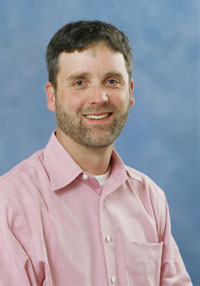 David Van't Hof
David Van't Hof
David Van't Hof is the sustainability policy advisor for Oregon Governor Ted Kulongoski. Mr. Van't Hof's areas of focus include implementing the Governor's Executive Order on sustainability, directing the Governor's climate change initiatives, and fostering the development of renewable energy and associated technologies in Oregon. Prior to joining the Governor's Office, Mr. Van't Hof spent five years working for Stoel Rives LLP as a private sector attorney, focusing on natural resources, land use, and administrative law, with an emphasis on major project permitting and water rights. Mr. Van ?t Hof has served on several non-profit boards. Before launching his law career, Mr. Van't Hof served two years as a Peace Corps volunteer in Senegal, West Africa. He graduated cum laude from University of Michigan Law School in 1995, and Trinity College in Hartford, Connecticut, in 1988.
 Mike Walsh
Mike Walsh
Dr. Michael J. Walsh, Co-Chair of the 50th Anniversary of the Global CO2 Record Symposium & Celebration, is an Executive Vice President of Chicago Climate Exchange, Inc., the world’s first and North America’s only voluntary, legally binding greenhouse gas reduction and trading program for all six greenhouse gases with offset projects worldwide. CCX’s affiliated companies, European Climate Exchange and Chicago Climate Futures Exchange, host markets for futures products based on European Union carbon dioxide emission allowances and U.S. sulfur dioxide emission allowances. Walsh also serves on the Board of Directors of the Montreal Climate Exchange.
In his prior position with Environmental Financial Products (the predecessor company to CCX), Mr. Walsh arranged several international carbon credit transactions and served as liaison and lead writer for a series of five technical papers on international emissions trading prepared for the Government of Canada. As a consultant to the U.S. Agency for International Development, Mr. Walsh provided instructional seminars on emissions trading for industry and government officials from several eastern European countries. He has been a speaker at United Nations climate conferences at Geneva, Kyoto, Buenos Aires, Bonn and The Hague, and has been a keynote speaker at industry conferences and educational workshops around the world, including events in Budapest, Moscow, Rio de Janeiro and Sydney.
Mr. Walsh also previously served as a Senior Economist with the Chicago Board of Trade where he directed the Chicago Board of Trade’s efforts to develop exchange-based environmental markets. Walsh designed and managed annual auctions of sulfur dioxide emission allowances conducted as part of the U.S. Environmental Protection Agency acid rain reduction program. Mr. Walsh has delivered Congressional testimony and provided dozens of presentations to state public utility commissions, national regulatory conferences and industry seminars. As the lead CBOT energy market analyst, he covered electricity market deregulation and evaluated the feasibility of electricity futures contracts. Mr. Walsh also directed, in conjunction with a team of industry and public sector leaders, establishment of the CBOT Recyclable Materials Exchange, an electronic marketplace backed by product standards, grading procedures and dispute resolution services. Walsh represented the CBOT in matters involving several U.S. government agencies including the Commodity Futures Trading Commission, the Internal Revenue Service and the Environmental Protection Agency.
Prior to his position with the Chicago Board of Trade, Mr. Walsh was a Financial Economist in the Office of Tax Policy in the U.S. Department of the Treasury. In that position he conducted industry studies of economic depreciation rates and co-authored a comprehensive review of the history of tax depreciation policy. Walsh has also served as a consultant to the Michigan Treasury Department and the West Virginia Tax Study Commission.
Mr. Walsh has been on the faculties of the University of Notre Dame and the Illinois Institute of Technology, and has lectured at Princeton, Northwestern, Colorado, Illinois and Johns Hopkins (Bologna). Walsh holds Bachelor of Science degrees in Economics and Political Science from Illinois State University, and M.S. and Ph.D. degrees in Economics from Michigan State University.
 Ray Weiss
Ray Weiss
Dr. Ray Weiss is Distinguished Professor of Geochemistry and Associate Dean of Academic Affairs at Scripps Institution of Oceanography. He hasparticipated in 24 major oceanographic and limnological expeditions since 1964, including two extended icebreaker expeditions in the Antarctic and three DSRV Alvin diving expeditions. He served as Chief Scientist on nine of these expeditions. Weiss is a member of the American Association for the Advancement of Science, American Geophysical Union, The Oceanography Society, and The Geochemical Society. Weiss has served on numerous national and international committees, and on the editorial boards of several prominent journals. He was Associate Editor of the Journal of Geophysical Research, Oceans section and Atmospheres section, and serves on the Editorial Board of the Journal of Atmospheric Chemistry. He served on the National Academy of Sciences Committee on Atmospheric Chemistry, the USGCRP Carbon Cycle Science Plan Working Group, and many other boards and committees. Weiss has received many honors, including becoming Fellow of the American Association for the Advancement of Science; Fellow of the American Geophysical Union; Editor's Citation for Excellence in Refereeing, Journal of Geophysical Research, Oceans Section; and Vannerberg Lecturer in Chemistry, Chalmers Technical University and University of Gothenburg, Gothenburg, Sweden. Weiss earned a Ph.D. in Earth Sciences, Scripps Institution of Oceanography, UC San Diego, 1970; an M.S. in Earth Sciences, Scripps Institution of Oceanography, 1966; and a B.S. in Chemistry, California Institute of Technology, 1964.
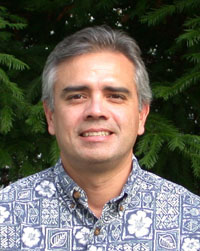 James C. Zachos
James C. Zachos
Dr. James Zachos, is Professor of Earth Sciences at the University of California, Santa Cruz. He has authored over 88 publications on the evolution of Earth’s climate over the last 65 million years. He primarily measures the chemical composition of marine microfossils to reconstruct past changes in the oceans physical and chemical characteristics, for example temperature and carbon chemistry. Much of his recent research has focused on the causes and consequences of episodes of rapid and extreme warming. Zachos has served on numerous national and international committees and advisory panels, and on the editorial boards of several prominent journals. He is a fellow of the Geologic Society of America, the Canadian Institute for Advanced Research, and is a member the U.S. Carbon Cycle Scientific Steering Group. He received his Ph.D. in 1988 from the University of Rhode Island’s Graduate School of Oceanography, and spent 4 years at the University of Michigan as a post-doctoral fellow and assistant research scientist before arriving in Santa Cruz in 1992.

